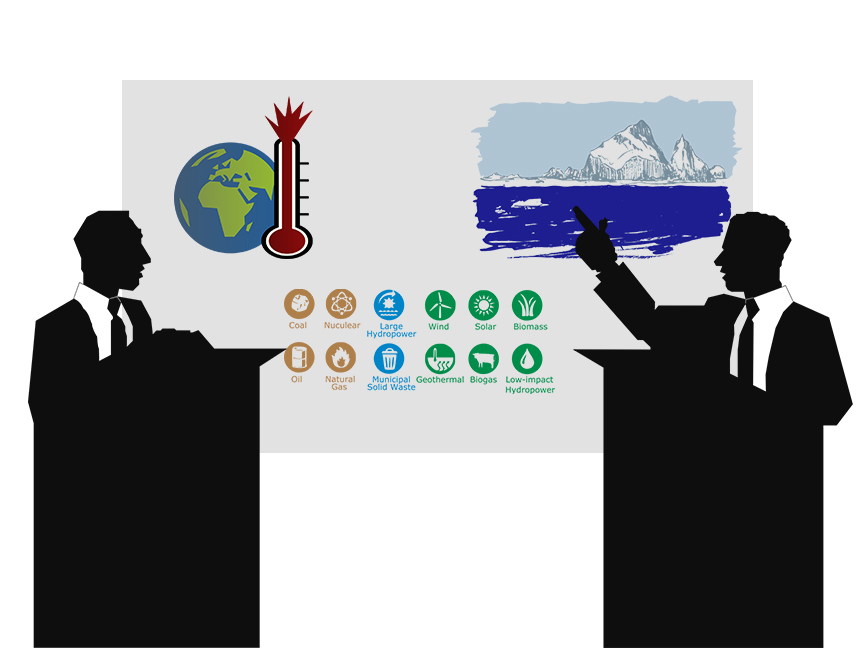OPINION: Presidential debates need to address climate change
Climate change affects everyone; it needs to be more prevalent in the political conversation
For the presidential debates to treat climate change like an afterthought does everyone a disservice.
October 12, 2020
Earth is not doing well, and the next president will help determine if there will be more detrimental effects. President Donald Trump’s policies are benefiting businesses at the expense of our environment. Joe Biden openly supports reducing pollutants and greenhouse gases, which will help slow climate change, but why should you care?
The effects of climate change will personally affect you. It’s already affecting people across the world.
Steve Katz, environmental researcher and associate professor at WSU, said crops are already suffering because of the effects of climate change.
Climate change is causing flooding, pollution and refugee crises, indicating the effects are actually much more widespread and faster than people think.
“We used to say it’s prolonged, and you can’t see it. We may have been wrong,” Katz said. “It’s happening fast. Why should people believe in climate change? They should believe it because we can measure it.”
On June 1, 2017, President Trump announced the United States would be withdrawing from the Paris Agreement, wish is climate accords focused on bringing down CO2 levels around the world. Trump had issues with the terms of the accord, but overall, the consensus was that the agreement was a step in the right direction.
“By the time you get to Paris, it’s 188 countries who committed, and 98.5 percent of the world’s greenhouse gas emissions would have been addressed in one way or another. All of those emissions would then have come under some agreement,” Katz said. “The bad things people have said, some of them are true, but those same people refuse to see the successes that the Paris Agreement was.”
President Trump also passed legislation called the Dirty Water Rule. This policy chooses what waters will be protected from pollutants, and the effects of the legislation have reached Washington. The Environmental Protection Agency is also trying to rollback Washington state water standards.
Alyssa Barton, policy manager for Puget Soundkeeper Alliance, said they are currently challenging this rule in court.
“For both the dirty water rule and the rollback of Washington’s water quality standards, we are in court right now for those issues challenging the EPA,” Barton said. “Litigation is an important tool in the toolbox. When you try sitting at the table and having the conversations to influence the policy, and that doesn’t work, being able to challenge these problematic policies in court can be very powerful.”
What is the flipside of hurting the environment? Trump is trying to make it easier for businesses to earn more money and follow fewer regulations.
Barton said lowering regulations would help businesses make money.
“When the president came into office, he came in on a deregulation platform, taking the position that regulations are bad for business. [Trump said] they’re time-consuming and expensive to comply with,” Barton said. “They create a barrier for business from people being able to make money. By removing clean water act protection from a lot of waters, this might make it easier for businesses to operate if they’re a pollution business.”
The debate around climate change became political on whether it’s real, or not.
Katz said a person’s belief does not change if climate change is happening.
“There are global observations of ocean temperatures going up,” Katz said. “There’s a lot more [carbon dioxide] in the atmosphere now than there used to be. We understand well how CO2 prevents long-wave radiation from exiting the atmosphere, and that predicts that the atmosphere gets warmer.”
Katz said for first-year chemistry students, they demonstrate ice melting in a water cup, which shows climate change. The exercise involves students placing an ice cube in a cup and having them measure the temperatures as the ice melts, showing that the temperature doesn’t change.
“If you have a chunk of ice, that ice is about zero degrees Celsius. As that ice melts, there’s still some ice in there, so the ice is still zero, and the water around it, if it’s well mixed, is also zero,” Katz said.
But students will still have to heat the ice cube and put energy into it so it melts, Katz said. Only after the ice melts, will students continue to add heat and the temperature will go up, he added.
“So when these ice caps are melting, the temperature change is tiny, but the heat that’s going in it is thousands of atom bombs worth of energy coming from the sun. It’s always coming from the sun,” Katz said. “The difference now is it’s not leaving.”









